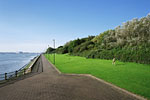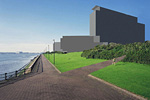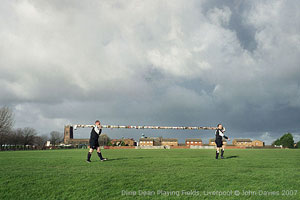| |
Massive tree clearance for new Festival
Gardens Park
At the Friends of Liverpool Festival Gardens AGM on 26
May, held at Lark Lane Community Centre, representatives for the new Garden
Festival Park development were in attendance: The Project Manager, Steve
Dawson of Planit who designed the new park, David Evans from the Land
Restoration Trust (LRT) who will manage the park on completion next year.
A major concern for the Friends was the massive tree clearance for the
new park but Steve Dawson of Planit claimed that this was in accordance
with the approved plans.
Cllr. John Coyne was present and he asked what was the point of consultation
with the Friends Group if it has not led to any changes to the design
of the park? Steve Dawson replied to say that discussions with the Friends
had led to some very minor changes.
The 3 phases for the new Garden Festival Park
project were explained:
Phase 1: The current phase of construction. Whilst the
Park is being constructed the role of the LRT is to consult community
and user groups and to appoint a site manager by Autumn this year. The
Trust are working with Langtree, Planit and Liverpool City Council.
Phase 2: From March 2011, when the park is due to be completed and open
for visitors, for a period of 5 years the Park will be maintained with
a grant from the North West Development Agency (NWDA). The grant, for
£100,000 per annum, is to cover management and to include the opening
and closing of the gates, grass cutting and litter picking. The southern
grasslands will continue to be under the care of Langtree as funding has
not yet been found for this to be included within the Park although full
planning permission has been given for the grasslands to be included in
the new park.
Phase 3: After the 5 year NWDA grant has finished an endowment from Langtree
is to be handed over to the Land Restoration Trust to cover future maintenance
of the Park, but this will only take place if and when Langtree's planned
built development commences. The LRT will then hold the lease for the
Park, including the grasslands, and be able to liaise with the community
for the Park's future development.
more below
Liverpool's mess in Stanley Park
Front page news from the Liverpool Daily Post on 24 March
2010 reports that Liverpool City Council (LCC) faces a £8.2m bill
to pay back European grants if Liverpool Football Club (LFC) fails to
build a new stadium on the historic public open green space of Stanley
Park in Anfield. The Audit Commission reports that Liverpool's management
of grant funding during 2008/09 was a 'significant issue'.
In 2007 Our Ground first reported on these financial
issues in the Stanley Park Privatisation &
Stadium feature.
Details of the partnership between LFC (Stadco), LCC and their Joint Venture
Company along with European and NWDA funding can be seen here
in the Council's 2007 report: New Anfield - The Restoration of Stanley
Park PDF (including a map of the park and other land allocated for
LFC). This report acknowledged financial risks if the Council accepted
these multi-million pound grants but pointed out that LCC were finalizing
a letter of credit from the Royal Bank of Scotland on behalf of LFC.
Delays in 2007 to set up a deal with Liverpool Football Club, including
the management security for the whole of Stanley Park, has also effected
the Objective One European grant for the Stanley
Park Restoration and re-construction of the Gladstone Conservatory.
This grant aid finished at the end of 2008 with LCC having to foot the
bill for all expenses carried out during 2009.
The original 'Palm House' Conservatory was opened to the public at the
beginning of 1900 but by the 1990's it was left derelict by the Council.
Work stared in the winter of 2007 to completely rebuild the structure
with an additional basement cafe for the general public. The spacious
glass-house upper floor is only available for private hire - without any
vegetation cover but with a bar. The new building, re-furbished band stand
and grounds are now gated with perimeter fencing. Now known as the Isla
Gladstone Conservatory it was completed in June 2009 at a cost of £12m.
Otterspool Park land sold off
The sale of land from Otterspool Park was approved by LCC
on 29 January to "grow the City's economy". A plan and details
of this park land can be found in the 2008 news item here:
Otterspool Park Privatisation.
Full details of the Council meeting minutes with details of all the objections
and the Council's/Officer's response is available as a
pdf from the Council's web site here.
Work starts on Festival Gardens Park
Work has now started to create a new park on a section
of the former Liverpool Garden Festival site with a
£3.7m grant from the North West Development Agency (NWDA). The
new private park, available to the public, is the key justification for
Langtree's development to include 1,308 compact apartments and 66 townhouses
on this former toxic landfill site.
As a requirement the park has to be finished by July 2011. When open to
the public the Land
Restoration Trust will take over management of the park and maintenance
costs will be covered by the NWDA grant for the first five years. As part
of the planning agreement Langtree are required by LCC to provide a £2m
dowry for ongoing maintenance of the park. This dowry is a reduced amount
from what was promised during the Public Inquiry
in 2008.
At short notice the Land
Restoration Trust organised a drop-in session for the public to view
the plans for the park at Shorefields Technical College on the 24 February.
Was this supposed to be a public consultation? The organisers told Our
Ground they will organise another meeting in the near future
to encourage the involvement of local community groups.
A Community Liaison Leaflet not available for this session states that
the managing director of Langtree regards the local community as a partner
in the scheme! The
Festival Gardens Community Liaison Leaflet (pdf) can be downloaded here
and also shows the Planit design of the park for Langtree Developments.
Illustrations of the housing plans integrated into the Festival Gardens
Park can be viewed
here from Langtree's web site.
 .
.

Coming soon on the public open green space of Otterspool Promenade:
Langtree's Festival Garden's development row of 7 'finger blocks'. The
Our Ground illustrations, shown above, drawn from Langtree's
architectural plans were first presented at the 2008
public inquiry to show the effect of the development on the Promenade.
The accuracy of the illustration was not rebutted by Langtree. Local
newspapers refuse to show this view of the development.
Yahoo! deletes 'save the festival gardens'
web site
The 'Save the Garden Festival Campaign' web site and all
the archived reports and images has been lost when Yahoo deleted and closed
all geocities web sites it hosted including the campaign web site. The
older out of date 2002 Garden Festival Campaign site still remains online.
The Our Ground web site and the Riverside
Drive Community web site appear to be the only independent voices
on the web with a special ongoing interest in the Festival site.
'Dutch Farm' public open green space sell
off
On the 26 February the City Council agreed to sell off
over half (about 9 acres) of public open green space known as the 'Dutch
Farm' in Garston. The Council had previously given planning permission
for a South Liverpool Academy and then needed the Dutch Farm land for
the development. For more details of objection and response see item
164e from the Executive Board meeting.
The new Academy will replace St. Benedict's and New Heys schools. Both
these schools have recently disposed of land for private developments.
Near to these schools and Dutch Farm land 'PC World' have built a self-contained
large store and car park on the former school playing fields at the corner
of Speke Road and Horrocks Road.
A national perspective and Liverpool
Today, different central government departments have conflicting
views over the value of public open green space. Some encourage local
councils to sell off public land where others see the same public open
space as an essential part of the urban infrastructure for a wide range
of environmental, social and economic objectives and activities.
The National Playing Fields Association, renamed Fields
in Trust, have recommended a ‘Six Acre Standard’. Where
a provision of 6 acres (24,000 m2) per 1,000 head of population as a minimum
open space requirement and easily reached by people. This measure is recommended
by the Department
of the Environment in it's planning guidelines.
Liverpool reaches the Six Acre standard in terms of space requirement
but there is an unbalanced distribution of public open space throughout
the city. To address the balance Liverpool is aiming to provide children's
playgrounds accessible to a wider spread of the population.
Even though Liverpool boasts many historic Grade II listed parks a 2008
Research Council study into the history of Liverpool parks found that
since the 1970s, there has been 'serious neglect' of parks and the management
of urban green space 'has not been seen as a priority by the City Council'.
Statistics published in the House of Commons show 203 school and community
sports pitches have been lost in England and Wales under the current government.
With ministers approving 49 sales in the four years since it was announced
that London would host the 2012 Olympics. Before March 2009 it was possible
to sell off areas of sports grounds covering less than an acre without
any ministerial approval and it is estimated that more than 1,000 smaller
sports fields and areas of school playing fields have also been lost in
recent years.
When preparing to dispose of sports and playing fields local
authorities inform Sport
England for comment. There are many examples in Liverpool where Sport
England have not objected to the loss of public open green space or school
playing fields - they only appear to be concerned with indoor sporting
facilities.
An
informative House of Commons note published in December 2009 describes
some of the issues and government objections to further protect school
playing fields from being sold off for development and to protect public
open space in the planning system.
The Value of Urban Parks
Britain was the first country in the world to develop municipal
parks mainly in the industrial centres of northwest England. Amongst others,
Prince's Park Liverpool (1842), Birkenhead Park (1847), Hesketh Park Southport
(1868) and Stanley Park Liverpool (1870) have been listed by the Garden
History Society and Victorian Society as fine examples of this trend.
"Urban Parks and Green Spaces are an essential part of the urban
heritage and infrastructure, being a strong element in the architectural
and landscape character of a city, providing a sense of place and engendering
civic pride.
They are important for enabling social interaction and fostering community
development. Public green spaces help conserve natural systems, including
carbon, water and other natural cycles, within the urban environment,
supporting ecosystems and providing the contrast of living elements in
both designed landscapes and conserved wildlife habitats within our urban
settlements.
They are supportive of social and economic objectives and activities.
In particular the provision of public parks helps to reduce the inequalities,
poor health and social exclusion in deprived areas and reduces the inherent
tension between the many social and ethnic groups. Providing for the recreational
and leisure needs of a community assists the economic revival of cities,
increasing their attractiveness as a place for business investment, to
live, work and take our leisure."
Institute of Leisure and Amenity Management
quote
from The Environment, Transport and Regional Affairs Committee report
Add news and information to this site
Our Ground welcomes any information about the loss of public
open space. Please send event information about parks, playing fields
and other public open spaces to info@ourground.net
|
|
.


